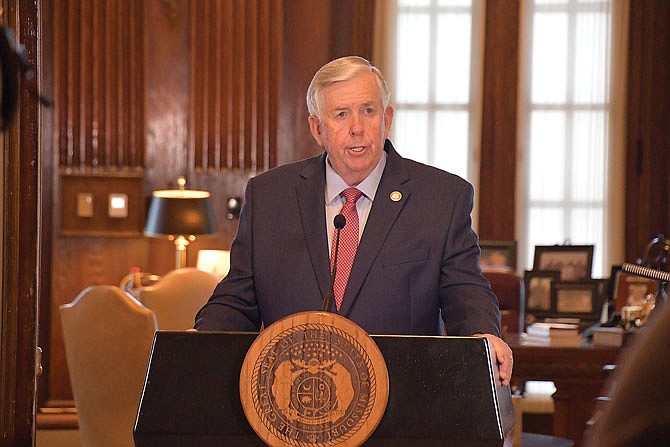After Gov. Mike Parson said his administration is looking at "all options" to support hospital staffing as COVID-19 patients strain health care systems, there is not yet much publicly available information on what that might mean.
Parson, a week before Thanksgiving, urged Missourians and their local governments to take precautions to curb coronavirus spread as he extended the state of emergency that's been in effect since March.
The availability of hospital beds and health care staff remain concerns amid surging numbers of COVID-19 cases and patients.
Parson said options to support hospital staffing might include using the military or bringing in health care workers from other states.
Anna Friederich-Maggard, director of public affairs for the Missouri National Guard, told the News Tribune last week: "The Missouri National Guard continues assessing requirements alongside DHSS, SEMA, and other state and local partners to determine potential requirements," should the Guard be asked to assist with hospital staffing.
Friederich-Maggard said the National Guard had not been asked to assist with hospital staffing. However, she added, "We currently have 12 personnel (68Ws/EMTs) assisting at a Missouri Veterans home in a CNA capacity at the request of the Missouri Veterans Commission."
A 68W is the National Guard's "health care specialist" position, "primarily responsible for providing emergency medical treatment, limited primary care, and health protection and evacuation from a point of injury or illness," according to the job description.
In addition to treating battlefield casualties, such duties may be a part of assisting with outpatient and inpatient care, preparing blood samples for laboratory analysis and preparing patients, operating rooms, equipment and supplies for surgery.
68W soldiers receive 16 weeks of advanced individual training at Fort Sam Houston in Texas, including "practice of inpatient care," in addition to their 10 weeks of basic combat training.
The National Guard also offers a variety of other medical specialty options for enlisted soldiers, including in respiratory care, biomedical equipment maintenance, operating room assistance, medical logistics and radiology. Some specialties require more training, such as 36 weeks of advanced individual training for the respiratory specialty.
"Due to operational security concerns, I cannot provide specifics on numbers of medical forces available," Friederich-Maggard said of the Missouri National Guard's capabilities.
Assistant U.S. Secretary of Defense Kenneth Rapuano said last week, "There are over 20,000 National Guardsmen deployed in 52 states and territories providing COVID support. DOD has military medical personnel on prepare-to-deploy orders, available to support state and local requests for assistance that come through FEMA and HHS within as early as 48 hours upon request."
Rapuano added, "Our current support includes 62 medical personnel, that's three medical support teams to support three hospitals in El Paso, Texas; 60 nurses and additional personnel to support local hospitals and long-term care facilities in North Dakota; and in Guam, we have 18 medical professionals for 24/7 telemedicine support for the civilian hospital on the island. We also have a small critical care physician team being sent to a local hospital in Guam."
The Grand Forks Herald reported the group of 60 U.S. Air Force personnel in North Dakota, mostly nurses, would be divided into specialty units to assist hospital staff in four cities, and the relief came after a request to the Federal Emergency Management Agency by the state's governor.
The Herald also reported North Dakota's state health department "has contracted with a temporary staffing agency that will provide another 60 civilian nurses for work in hospitals and nursing homes beginning this weekend."
It's not immediately clear how possible it would be in the weeks ahead to bring in civilian health care workers from other states to Missouri - Parson's other suggested avenue of addressing staffing - given that almost every other state in the country has also had critically high levels of new COVID-19 cases, including many of Missouri's immediate neighbors such as Iowa, Kansas and Nebraska.
The News Tribune asked Parson's office last week what channels the governor is going through to look at bringing in medical staff from other states.
Spokeswoman Kelli Jones said, "Gov. Parson is in regular contact with the Missouri Hospital Association and hospital leaders. Hospitals are working with the Parson administration to address the staffing crisis in hospitals." Jones said she would provide more information as it's confirmed.
When announcing before Thanksgiving that he was extending the state of emergency, Parson would not give a specific timeframe as to when a decision or announcement may come on measures to support staffing at hospitals but said work continues every day.
Parson said he's looking at how to use people in training and how to free up professionals from tasks such as taking temperatures that could be done by less-skilled workers.

